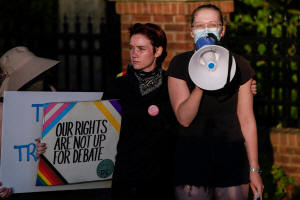U.S. clinics scramble as courts, politicians battle over abortion
restrictions
 Send a link to a friend
Send a link to a friend
 [August 22, 2022]
By Sharon Bernstein [August 22, 2022]
By Sharon Bernstein
(Reuters) - With West Virginia's 1849
abortion ban tied up in court and its conservative legislature stymied
over details of enacting a new one, the state's only abortion clinic
ought to be operating as usual.
But the chaotic legal and political environment in the two months since
the U.S. Supreme Court ended the right to an abortion has driven
unexpected reductions in the services that the clinic can provide,
leading its doctors to end most medication abortions and eliminate
surgical abortions for women who are more than 16 weeks pregnant.
The uncertainty at Women's Health Center in the state capital of
Charleston has been mirrored in other states since the Supreme Court
overturned its Roe v Wade decision on June 24, ending a 49-year-old
precedent that established a right to an abortion.
In North Carolina, Utah and elsewhere clinics have limited services
simply because of the threat of new abortion restrictions, fearful that
procedures spanning more than a day could be interrupted by a court
decision or the sudden passage of a law.
"On the day Roe was overturned we had patients scheduled for the
following three weeks - we had to give them information on how to go out
of state," said Katie Quinonez, executive director of Women's Health
Center.
Weeks later, the center persuaded a county judge to temporarily halt
enforcement of the 19th century ban, which was triggered by the Supreme
Court decision. And following that, a special session of the state's
Republican dominated legislature - called to enact a new ban - adjourned
amid squabbling over how far to go.

A DAY'S NOTICE
But the uncertain environment has made it difficult for the West
Virginia clinic - and others - to provide many previous services.
Quinonez said one physician who had provided abortions up to almost 18
weeks had been traveling to West Virginia from another state, but
stopped amid the uncertainty, deciding instead to work closer to home.
And the clinic's lawyers advised it to cease offering most abortion
pills, because the two-day procedure could be interrupted by an
unexpected court decision, Quinonez said.
In North Carolina, Planned Parenthood clinics for a time stopped
offering abortions for women who were beyond 20 weeks gestation, fearing
the two-day procedure could begin one day, and be outlawed the next,
said Paige Johnson, Vice President of Planned Parenthood South Atlantic.
A court upheld a 20-week abortion ban there on Aug. 18.
In South Carolina, where a six-week ban was in place until last week,
Planned Parenthood doctors warned women that they could be within the
legal limit to obtain an abortion one day, but outside of it the
following day, once they waited for the state's 24 hour notification
requirement.

[to top of second column]
|

Abortion rights supporters demonstrate
near the home of Supreme Court Justice Clarence Thomas in Fairfax
Station, Virginia, U.S., June 24, 2022. REUTERS/Elizabeth
Frantz/Files
 And Utah clinics stopped providing
later term abortions after one court ruling kept abortion legal but
another allowed a restriction on abortion after 18 weeks to kick in.
For a few days after the Supreme Court ruling, clinics there also
did not provide two-day procedures.
"Rapidly changing laws and court decisions ...
really force providers to weave through a patchwork of laws that can
change in a day's notice," Johnson said.
The court decisions are being propelled by lawsuits and
counter-suits filed by proponents and opponents of abortion over
which laws should be in place.
Also driving the uncertainty are disagreements among Republicans,
who make up the bulk of the anti-abortion coalition, on how strict
limits or bans on abortion should be.
Opposition to abortion has been an article of faith for years among
Republican elected officials, many of whom fought for laws limiting
access to the procedure even under the broad constitutional
protection provided by Roe v Wade.
But once the high court overturned those protections, cracks in the
anti-abortion coalition began to appear in Republican states
including Louisiana, Florida and Nebraska.
In Louisiana, a bill allowing women and their doctors to be
prosecuted for homicide failed in the legislature, under opposition
from some Republicans as well as the state's Right to Life
organization.
The reasons are both personal and political for Republican
lawmakers, said sociologist Carole Joffe, who studies abortion
politics at the University of California, San Francisco.
"In any social movement, you have people with very different lines
that they are not willing to cross," Joffe said.

In West Virginia, the legislature's conservative super-majority was
set to enact one of the nationís strictest bans on abortion in a
special session this summer.
But the bill stalled after the state senate removed criminal
penalties for doctors who perform abortions.
"This is the perennial situation where the dog is chasing the car
and now they've caught it and they don't know what to do with it,"
said West Virginia State Senate Minority Leader Stephen Baldwin, a
Democrat.
Informal discussions about the bill are ongoing, said a spokeswoman
for West Virginia House of Delegates Speaker Roger Hanshaw, a
Republican.
(Reporting by Sharon Bernstein; editing by Paul Thomasch and Diane
Craft)
[© 2022 Thomson Reuters. All rights
reserved.] This material may not be published,
broadcast, rewritten or redistributed.
Thompson Reuters is solely responsible for this content. |